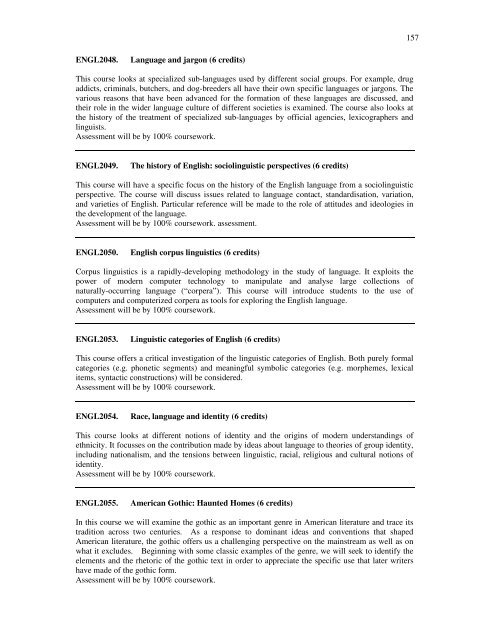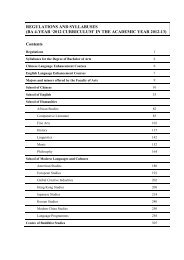Bachelor of Arts (BA) - The University of Hong Kong
Bachelor of Arts (BA) - The University of Hong Kong
Bachelor of Arts (BA) - The University of Hong Kong
You also want an ePaper? Increase the reach of your titles
YUMPU automatically turns print PDFs into web optimized ePapers that Google loves.
157<br />
ENGL2048.<br />
Language and jargon (6 credits)<br />
This course looks at specialized sub-languages used by different social groups. For example, drug<br />
addicts, criminals, butchers, and dog-breeders all have their own specific languages or jargons. <strong>The</strong><br />
various reasons that have been advanced for the formation <strong>of</strong> these languages are discussed, and<br />
their role in the wider language culture <strong>of</strong> different societies is examined. <strong>The</strong> course also looks at<br />
the history <strong>of</strong> the treatment <strong>of</strong> specialized sub-languages by <strong>of</strong>ficial agencies, lexicographers and<br />
linguists.<br />
Assessment will be by 100% coursework.<br />
ENGL2049.<br />
<strong>The</strong> history <strong>of</strong> English: sociolinguistic perspectives (6 credits)<br />
This course will have a specific focus on the history <strong>of</strong> the English language from a sociolinguistic<br />
perspective. <strong>The</strong> course will discuss issues related to language contact, standardisation, variation,<br />
and varieties <strong>of</strong> English. Particular reference will be made to the role <strong>of</strong> attitudes and ideologies in<br />
the development <strong>of</strong> the language.<br />
Assessment will be by 100% coursework. assessment.<br />
ENGL2050.<br />
English corpus linguistics (6 credits)<br />
Corpus linguistics is a rapidly-developing methodology in the study <strong>of</strong> language. It exploits the<br />
power <strong>of</strong> modern computer technology to manipulate and analyse large collections <strong>of</strong><br />
naturally-occurring language (“corpera”). This course will introduce students to the use <strong>of</strong><br />
computers and computerized corpera as tools for exploring the English language.<br />
Assessment will be by 100% coursework.<br />
ENGL2053.<br />
Linguistic categories <strong>of</strong> English (6 credits)<br />
This course <strong>of</strong>fers a critical investigation <strong>of</strong> the linguistic categories <strong>of</strong> English. Both purely formal<br />
categories (e.g. phonetic segments) and meaningful symbolic categories (e.g. morphemes, lexical<br />
items, syntactic constructions) will be considered.<br />
Assessment will be by 100% coursework.<br />
ENGL2054.<br />
Race, language and identity (6 credits)<br />
This course looks at different notions <strong>of</strong> identity and the origins <strong>of</strong> modern understandings <strong>of</strong><br />
ethnicity. It focusses on the contribution made by ideas about language to theories <strong>of</strong> group identity,<br />
including nationalism, and the tensions between linguistic, racial, religious and cultural notions <strong>of</strong><br />
identity.<br />
Assessment will be by 100% coursework.<br />
ENGL2055.<br />
American Gothic: Haunted Homes (6 credits)<br />
In this course we will examine the gothic as an important genre in American literature and trace its<br />
tradition across two centuries. As a response to dominant ideas and conventions that shaped<br />
American literature, the gothic <strong>of</strong>fers us a challenging perspective on the mainstream as well as on<br />
what it excludes. Beginning with some classic examples <strong>of</strong> the genre, we will seek to identify the<br />
elements and the rhetoric <strong>of</strong> the gothic text in order to appreciate the specific use that later writers<br />
have made <strong>of</strong> the gothic form.<br />
Assessment will be by 100% coursework.
















